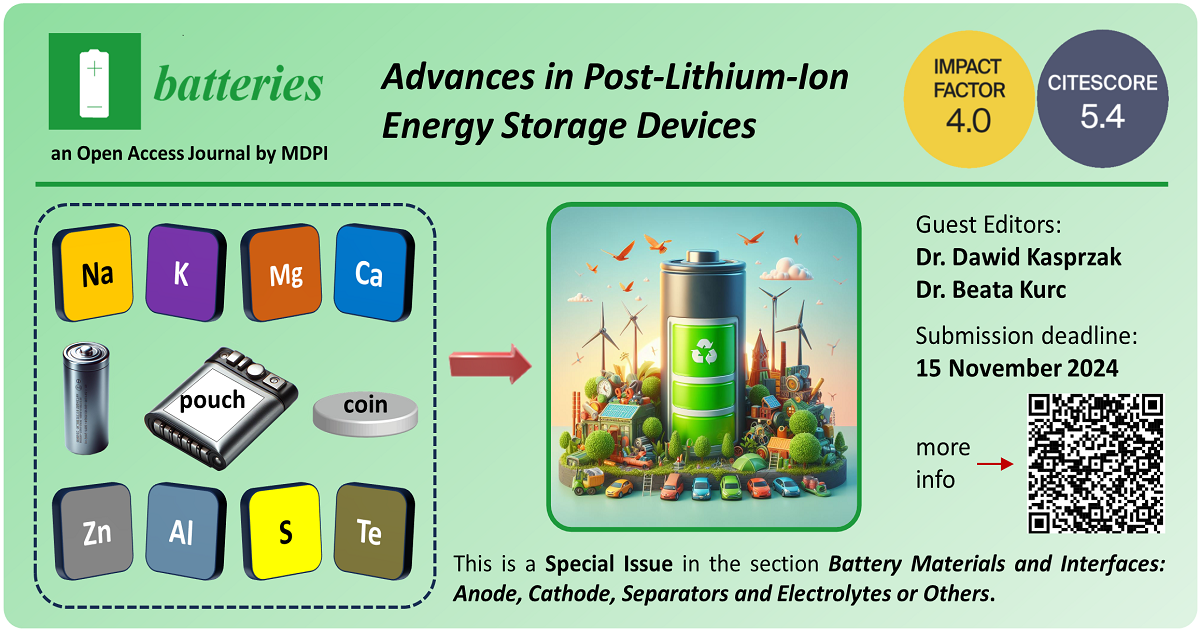- 4.8Impact Factor
- 6.6CiteScore
- 19 daysTime to First Decision
Advances in Post-Lithium-Ion Energy Storage Devices
This special issue belongs to the section “Battery Materials and Interfaces: Anode, Cathode, Separators and Electrolytes or Others“.
Special Issue Information
Dear Colleagues,
Lithium-ion batteries (LIBs) have dominated the commercial market of energy storage devices, serving as power supplies for various technologies ranging from daily electronics through electric vehicles to management systems for intermittent electricity. However, LIBs present challenges regarding operational safety, the expected increase in production costs, the risk of limited availability of raw natural resources, and universal waste disposal. Thus, pursuing post-lithium-ion batteries (PLIBs) is essential for advancing energy storage technologies, addressing cost and sustainability challenges, and meeting the growing demand for reliable and efficient energy storage solutions in a rapidly evolving energy landscape. PLIBs offer performance, cost, or chemistry improvements compared to LIBs, but these are still barely explored in commercial applications. Urgent and intensive research is required on the industrialization path of PLIBs, addressing challenges of new battery technologies, such as deep exploration of redox processes, material composition and cell designs, performance and life stability optimization, or safety concerns.
In this Special Issue, we are creating an exclusive platform to debate the potential of real battery competition against LIBs. The collection includes contributions discussing the latest advancements and emerging patterns in cutting-edge energy storage technologies. Contributions are encouraged to present both fundamental and applied research, addressing potential topics including, but not limited to, the following:
- Beyond lithium-ion battery chemistries (Na, K, Mg, Al, Ca-ion batteries);
- Metal-chalcogen batteries (e.g., metallic Li coupled with S, Se, and Te);
- Metal-air batteries (e.g., Li-air and Na-air systems);
- Aqueous Zn-ion batteries and their hybrids;
- PLIB configuration improvements (coin, pouch, and cylindrical types; wearable devices);
- Modelling, simulation, and Life Cycle Assessment (LCA);
- Safety, reliability, and sustainability.
Dr. Dawid Kasprzak
Dr. Beata Kurc
Guest Editors
Manuscript Submission Information
Manuscripts should be submitted online at www.mdpi.com by registering and logging in to this website. Once you are registered, click here to go to the submission form. Manuscripts can be submitted until the deadline. All submissions that pass pre-check are peer-reviewed. Accepted papers will be published continuously in the journal (as soon as accepted) and will be listed together on the special issue website. Research articles, review articles as well as short communications are invited. For planned papers, a title and short abstract (about 250 words) can be sent to the Editorial Office for assessment.
Submitted manuscripts should not have been published previously, nor be under consideration for publication elsewhere (except conference proceedings papers). All manuscripts are thoroughly refereed through a single-blind peer-review process. A guide for authors and other relevant information for submission of manuscripts is available on the Instructions for Authors page. Batteries is an international peer-reviewed open access monthly journal published by MDPI.
Please visit the Instructions for Authors page before submitting a manuscript. The Article Processing Charge (APC) for publication in this open access journal is 2700 CHF (Swiss Francs). Submitted papers should be well formatted and use good English. Authors may use MDPI's English editing service prior to publication or during author revisions.
Keywords
- beyond Li-ion batteries
- metal-ion batteries
- solid-state batteries
- Li-sulfur batteries
- alkali metals
- aqueous/organic electrolytes
- gel polymer electrolytes (GPEs)
- energy transition
- carbon electrode
- biomaterials

Benefits of Publishing in a Special Issue
- Ease of navigation: Grouping papers by topic helps scholars navigate broad scope journals more efficiently.
- Greater discoverability: Special Issues support the reach and impact of scientific research. Articles in Special Issues are more discoverable and cited more frequently.
- Expansion of research network: Special Issues facilitate connections among authors, fostering scientific collaborations.
- External promotion: Articles in Special Issues are often promoted through the journal's social media, increasing their visibility.
- e-Book format: Special Issues with more than 10 articles can be published as dedicated e-books, ensuring wide and rapid dissemination.

